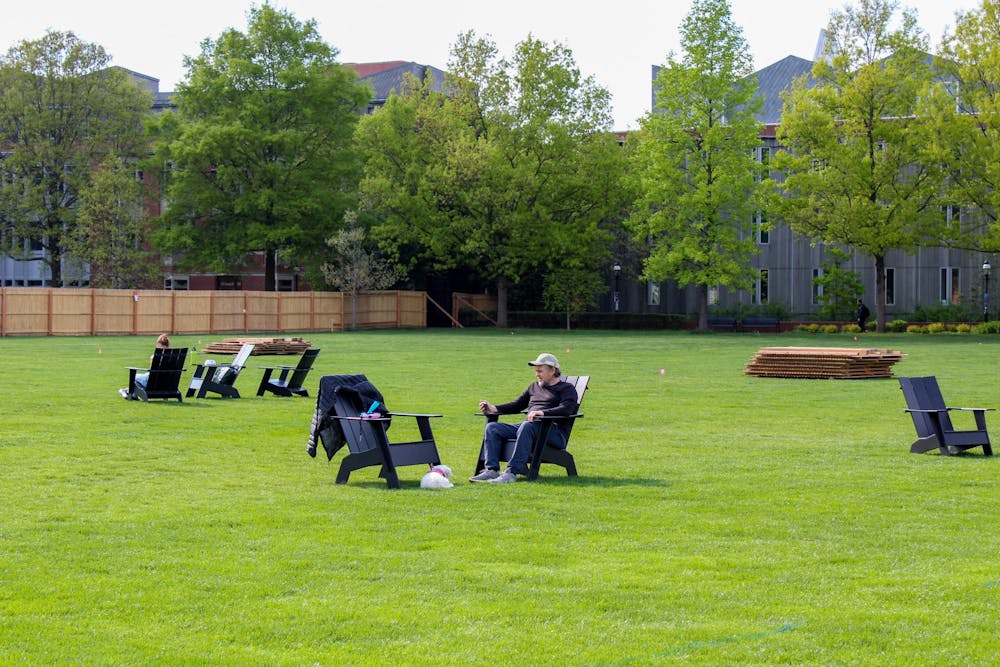Princetonians are worriers. And among other things, we worry constantly about our academic performance. The classic story: we’re at the top of our high school graduating classes, we excel academically, we apply to Princeton, we get in. For many, it’s hard to leave the 4.0 high schooler in the past.
But once you’re here, the most important part about Princeton isn’t your GPA or the post-graduation opportunities — it’s the undergraduate experience itself.
Our time at Princeton will always undoubtedly be clouded by the reality that the future is unstable and that we can’t control where we’ll end up after graduation. But we often overlook the things that could truly benefit us at Princeton — the things we can learn from the people, the experiences, the classes.
There’s only so much that we can control about our futures. We can take part in extracurriculars, take a class for major requirements, write a great thesis, and spend all of our summers doing internships, but we can’t guarantee an acceptance to our dream med school or grad school, or even a great career. As a senior, many of my peers are anxious about securing grad school or professional positions — myself included.
We struggle with the reality that our GPAs decide much of our future prospects, especially when a single grade during our first year can have such a great effect on our application success rate. This is especially the case for students applying to hyper-competitive programs like law school and med school: My friends who are pre-med have worried about their grades and GPAs since we first came to Princeton.
But GPA alone doesn’t make or break you. Take a med school applicant with a lower GPA, for example. They may not be accepted into their dream med school right after graduating, especially if the school is highly ranked. However, there are ways around this: they can do a medicine-related master’s, work in clinical research, or volunteer at hospitals during a gap year before reapplying. There are alternative routes to med school, as with most industries.
And with that said, Princeton itself is a place to maximize. It may only be four years, but four years at 18 or 22 are a large proportion of our lives. Four years spent worrying about the future, alongside others worrying about the future, is a perfect storm for bad mental health — and it seems that’s what college has become for many.
One way to alleviate this is to take classes and pursue academic pathways that you like. Focus on learning as much as possible rather than worrying about GPA. The classes where I’ve performed best are not the classes I’m worried about doing well in, but the classes that contain material I’m genuinely interested in and the classes I’m excited to attend every week.

I entered Princeton as a physics major who wanted to pursue a Ph.D. in Cosmology. I spent two years at Princeton taking physics, astrophysics, and math classes I didn’t fully enjoy because I spent so long stressing about my final grade, instead of focusing on learning and understanding material that I genuinely cared about. It was taking a class about bioethics during sophomore spring that convinced me to change my major to medical anthropology — in that class, I didn’t worry about my final grade or my GPA, but only about learning and producing work on topics I cared about. That’s been my reality while majoring in anthropology.
Through the classes I’ve taken in my junior and senior year, I’ve met people I deeply care about, because we are equally invested in learning, not just in getting an A. I now hope to pursue a Ph.D. in philosophy. As a first-year, I never thought I’d want to wait to start a Ph.D. But during the last two years, I’ve been thinking less about external measures of success like GPA and more about my own interests and personal goals. I’ve realized that I have so much time, and that there’s no rush.
And this brings me to the most important part of the Princeton experience: memories and relationships. In 25 years, at my 25th Reunion, I doubt I’ll be thinking about the C I got in Physics during sophomore fall. But I’ll certainly be remembering the weekly film screenings my friends and I went to at the Garden Theatre, the many times I sang with the Wildcats under Blair Arch, and talking about morality in a philosophy precept in 1879 Hall.
In 20 years, your college GPA will mean nothing. The ambition and perseverance that students at Princeton already display — as well as, face it, the Princeton name on our resumes guarantee that most, if not all graduates will end up in their desired industry. The means might look different than you expected when you were 18, but the ends can be the same. Sometimes there are lessons you have to learn through an alternative route that will make you better at the job you eventually want to have.

Here is my perspective: worrying about your GPA will only get you so far. Rather, it’s the hope that things will work out and that you’ll get to where you need to be that will drive you, regardless of your academic performance. Princeton students are great problem solvers. You will figure out how to make your situation work for you, and how to get from where you are to where you want to go. Spend less time stressing along the way.
Asa Santos is a senior from London, England and São Paulo, Brazil majoring in Anthropology, with minors in Gender & Sexuality Studies and Global Health & Health Policy. Santos’s column, “Opening the Gates,” runs every two weeks on Tuesdays. All of their columns can be read here.








